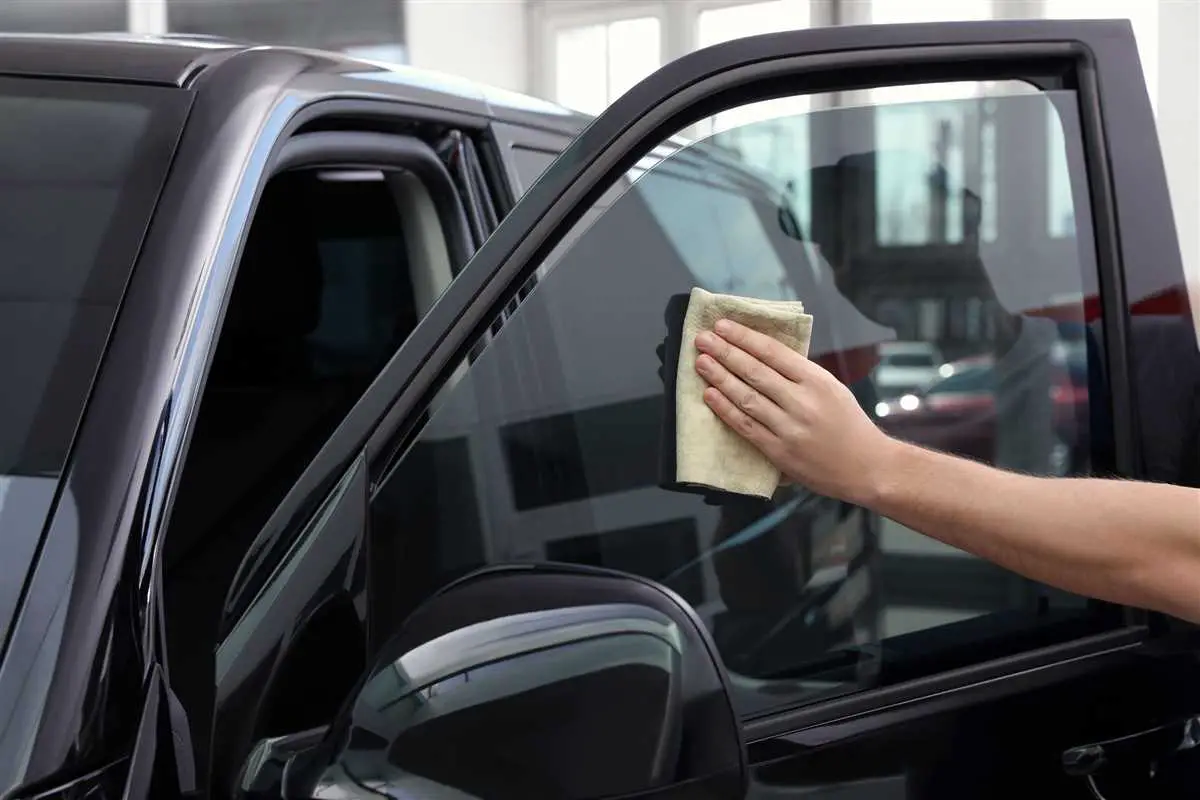Last Updated on February 28, 2024 by Vadym

Window tinting is a popular way to enhance the looks and functionality of a car. It offers privacy, protects the interior from harmful UV rays, reduces glare, and can even keep the interior cooler. However, one common question that often arises when considering window tinting is how long it takes to complete the process.
The time it takes to tint a car’s windows can vary depending on several factors. The size and number of windows being tinted, the complexity of the job, the experience and skill of the installer, and even the type of tint being used can all affect the duration.
On average, a professional installer can tint the windows of a car in about 2 to 4 hours. However, it’s important to note that this is just a general estimate. Some cars may require more time due to their unique window shapes or because the old tint needs to be removed first. Additionally, certain tints may have longer drying times or require multiple layers, which can extend the overall process.
It’s also worth mentioning that the time required for window tinting can be influenced by the weather conditions. Extreme heat or cold temperatures can affect the adhesive properties of the window film, making the installation process more challenging and time-consuming.
In conclusion, the time it takes to window tint a car can vary depending on various factors. It’s best to consult with a professional installer to get a more accurate estimate based on your specific needs and circumstances. Keep in mind that quality installation is crucial for optimal results, so it’s worth investing the time to find a reputable and experienced window tinting professional.
Why Window Tinting is Popular
Window tinting has become increasingly popular for a variety of reasons. Firstly, it offers numerous benefits to vehicle owners, making it a popular choice among car enthusiasts. One of the main advantages of window tinting is the enhanced privacy it provides. By darkening the windows, window tinting helps to prevent prying eyes from peering into the vehicle, thus protecting the privacy of the occupants.
In addition to privacy, window tinting also provides protection against harmful UV rays. The tinted film blocks a significant amount of UV rays, reducing the risk of skin damage and other UV-related health issues. This is especially important for those who spend long periods of time in their vehicles, as they are exposed to the sun’s harmful rays on a daily basis.
Furthermore, window tinting can significantly reduce the amount of heat that enters the vehicle, especially in hot climates. This not only helps to keep the interior cool and comfortable but also reduces the strain on the air conditioning system, resulting in improved fuel efficiency. By reducing the need for constant air conditioning, window tinting can also extend the lifespan of the vehicle’s cooling system.
Another reason window tinting is popular is its ability to enhance the overall appearance of a vehicle. The tinted windows provide a sleek and modern look that can enhance the aesthetics of any car. With a wide range of tinting options available, vehicle owners can choose the level of darkness that best suits their personal style and preferences.
Lastly, window tinting can also contribute to the resale value of a vehicle. Many potential buyers appreciate the added privacy, protection, and aesthetics that tinted windows provide. This can make a vehicle more attractive to buyers and potentially increase its resale value.
In conclusion, window tinting is popular for several reasons. It offers enhanced privacy, protection against harmful UV rays, heat reduction, improved aesthetics, and potential resale value benefits. With its many advantages, it’s no wonder that window tinting has become a popular choice among car owners.
Benefits of Window Tinting
Window tinting offers a variety of benefits for vehicle owners, making it a popular choice for many. Here are some of the key advantages of window tinting:
1. UV Protection: Window tinting can effectively block harmful UV rays from the sun, protecting you and your passengers from the potential health risks associated with prolonged sun exposure. This can help prevent skin cancer, premature aging, and other sun-related skin conditions.
2. Heat Rejection: Tinted windows can significantly reduce the amount of heat entering your car, keeping it cooler on hot days. This can help improve your comfort while driving and also reduce the need for air conditioning, leading to potential energy savings.
3. Glare Reduction: Tinted windows can minimize glare from the sun, headlights, and other sources of bright light, improving visibility and reducing eye strain. This can enhance safety while driving, particularly during daytime or night-time conditions with intense glare.
4. Privacy and Security: Window tinting provides an added level of privacy and security for you and your belongings. It makes it harder for others to see into your vehicle, deterring potential thieves and protecting your valuables from prying eyes.
5. Interior Protection: Tinted windows can help protect your car’s interior from fading, cracking, and discoloration caused by sun exposure. By blocking out the UV rays that can damage your upholstery, dashboard, and other components, window tinting helps prolong the lifespan and overall appearance of your vehicle’s interior.
6. Enhances Resale Value: Investing in window tinting can increase the resale value of your vehicle. Tinted windows are aesthetically appealing and can attract potential buyers who value the added benefits and overall enhanced look provided by window tinting.
Overall, window tinting offers a range of advantages that combine to make your driving experience safer, more comfortable, and more enjoyable. It is a worthwhile investment that can provide long-term benefits for both you and your vehicle.
Factors Affecting Window Tinting Duration
Window tinting is a popular option for many car owners as it provides numerous benefits such as heat reduction, privacy, and UV protection. However, the duration it takes to tint a car’s windows can vary depending on several factors:
1. Type of Window Tint: The type of window tint chosen will impact the duration of the installation process. Different options, such as pre-cut film or custom installations, can vary in complexity and time required.
2. Size and Number of Windows: The size and number of windows being tinted will directly influence the time it takes to complete the job. Vehicles with more windows or larger windows will typically require more time for precise installation.
3. Skill and Experience of the Installer: The skill and experience of the window tint installer can significantly affect the duration of the process. Experienced professionals who specialize in window tinting are often more efficient and can complete the job more quickly.
4. Complexity of the Vehicle’s Window Design: Some vehicles have intricate window designs with curves and angles that can complicate the tinting process. Tinting these types of windows may take longer due to the additional time required for proper fitting and installation.
5. Environmental Factors: Environmental conditions can impact the window tinting duration. Extreme temperatures or high humidity levels may require additional time for the tint to adhere properly and dry effectively.
6. Additional Customizations: If additional customizations, such as logos or patterns, are requested, the window tinting process may take longer to complete. These extra details require additional time and precision to ensure a quality installation.
7. Equipment and Tools Used: The quality and availability of equipment and tools can impact the time required for window tinting. Advanced tools and equipment can streamline the process, reducing installation time.
8. Preparation and Cleanliness: Proper preparation and cleanliness of the vehicle’s windows before tinting are essential. If the windows are dirty or have damage that needs to be addressed, additional time may be required to ensure proper installation.
Overall, the duration of window tinting for a car can range from a few hours to several days, depending on these various factors. It is important to consult with a professional window tint installer to get an accurate estimate of the time required for your specific vehicle and desired window tinting options.
Professional Window Tinting Process

Professional window tinting involves several steps to ensure a smooth and effective installation. Here is an overview of the process:
1. Preparation: Before beginning the tinting process, the professional will thoroughly clean the windows to remove any dirt, debris, or film. This step is crucial to ensure proper adhesion of the tint.
2. Measurement and cutting: The professional will measure the dimensions of each window and use a special tinting film cutting machine to cut the film to the exact size needed for each window.
3. Application of the tint: The professional will carefully apply the tinting film to each window, using techniques that minimize the risk of bubbles, creases, or uneven application. They will typically use a squeegee or similar tool to smooth out the film, ensuring a uniform and professional look.
4. Heat application: To activate the tinting film and ensure optimal adhesion, the professional will use heat. They may use a heat gun or a specific heat application tool to carefully heat the film, allowing it to conform to the shape of the window and adhere securely.
5. Drying and curing: After the tinting film is applied, it needs time to dry and cure properly. The professional will typically provide instructions on how long to wait before rolling down the windows or cleaning them. This typically ranges from a few days to a week, depending on the specific type of tinting film used.
6. Inspection and finishing touches: Once the tinting film has dried and cured, the professional will inspect the windows for any imperfections or issues. They will ensure that the film is properly adhered, without any bubbles or creases, and that it provides the desired level of privacy and protection. Any necessary touch-ups or adjustments will be made at this stage.
Overall, the professional window tinting process requires skill, precision, and attention to detail to achieve the best possible results. It is recommended to choose a reputable and experienced professional to ensure a high-quality and long-lasting tint job.
How Long Does Window Tinting Take?
Window tinting is a process that involves applying a thin film to the windows of a car to reduce heat and glare, as well as to provide privacy. Many car owners choose to have their windows tinted for various reasons, such as comfort, aesthetics, and safety.
The length of time it takes to tint car windows can vary depending on several factors, including the size of the vehicle and the experience of the installer. Generally, the tinting process can take anywhere from one to four hours.
First, the installer will clean the windows thoroughly to ensure that there is no dirt, dust, or debris on the surface. Then, a precise measurement will be taken to cut the tint film to the correct size for each window. Next, the film will be carefully applied to the windows using a special adhesive solution.
During the application process, it is important to avoid any air bubbles or creases in the film. The installer will use a squeegee or other tools to smooth out the film and ensure a clean and even application. Once the film is applied, it will need time to dry and bond to the windows. This can take several hours, depending on the weather conditions and the type of tint film used.
It is recommended to avoid rolling down the windows or touching the film for at least 24 hours after the tinting process is complete. This allows the film to fully adhere to the windows, ensuring a long-lasting and professional finish.
Overall, the window tinting process can be completed in just a few hours, but it is important to choose a reputable installer who can provide quality materials and workmanship. Taking the time to research and compare different tinting services can help ensure that you receive the best results and a tint job that will last for years to come.
Disclaimer: The information in this article is intended for informational purposes only and should not be considered as professional advice. Please consult a professional window tinting service for specific guidance.
